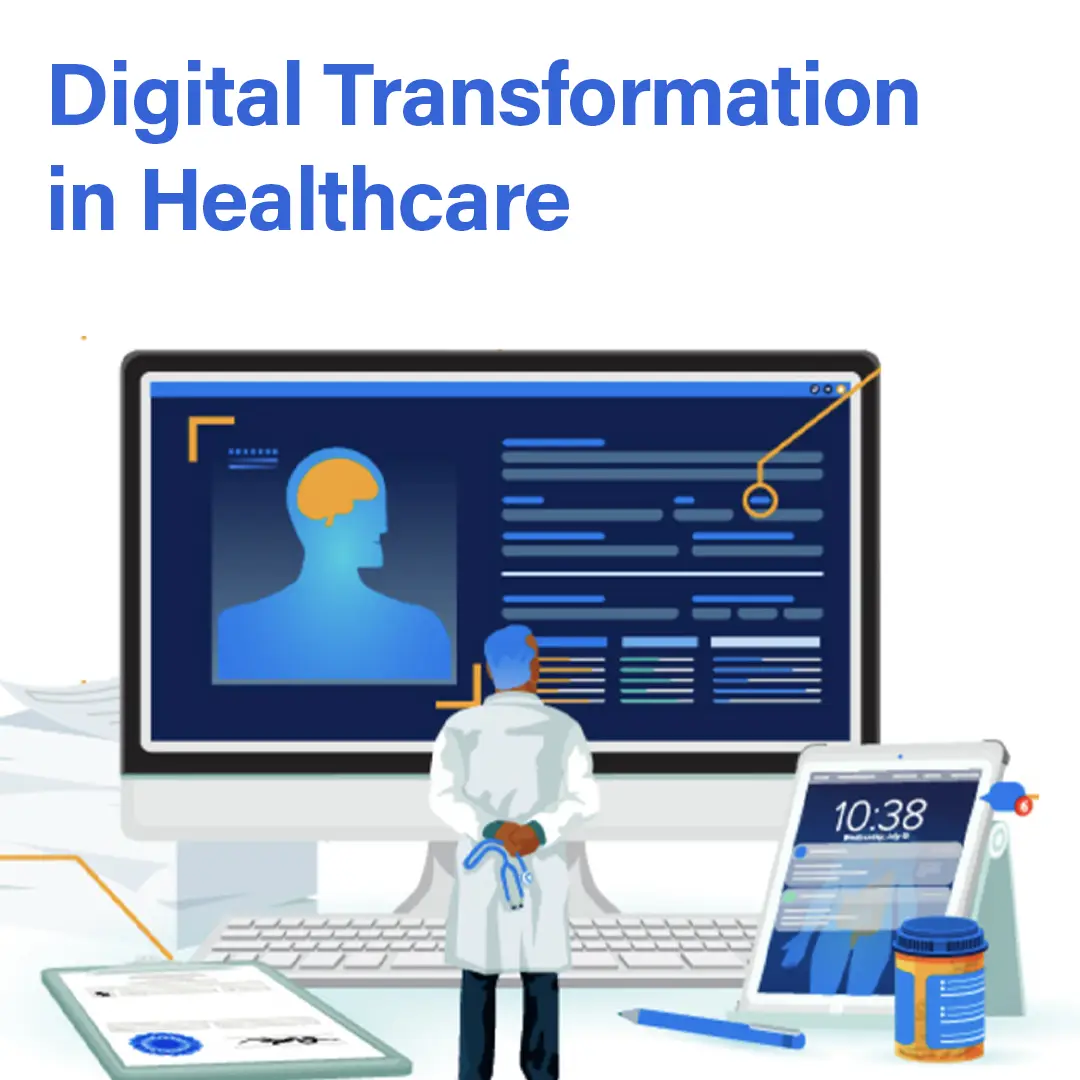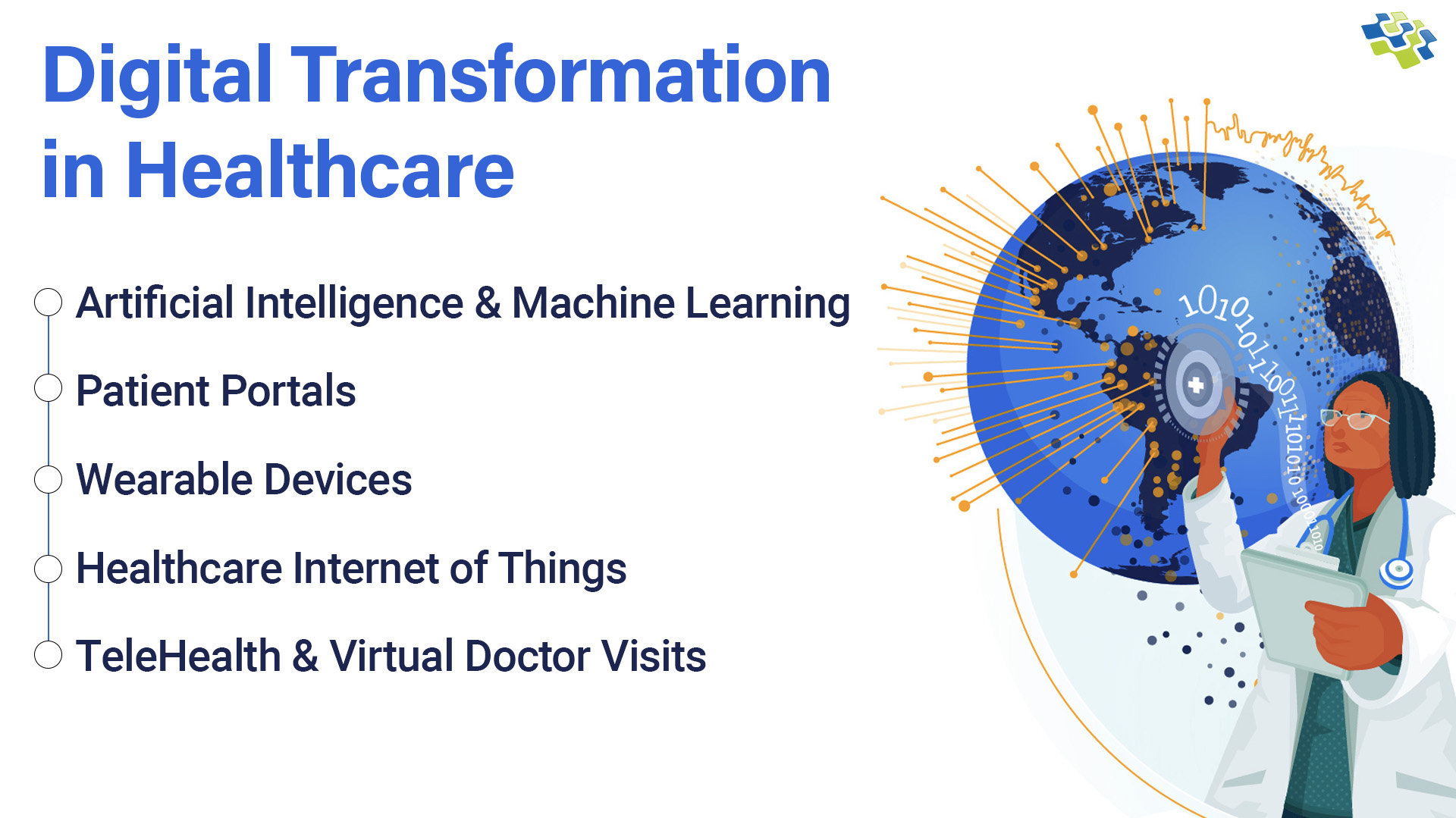How Digital Transformation Fuels Healthcare Innovation?
We delve into the changing healthcare landscape and talk about the advantages of digital technologies, new trends, and the challenges of complete industry digitization.

“In 2022, the US digital health market was valued at $77 billion. Predicted to grow at a 17.10% annual rate from 2023 to 2030, marking significant industry expansion.”– Grand View Research
What Digital Transformation in Healthcare Means?
Digital transformation in healthcare enables modular digital solutions, revolutionizing patient care. Technologies like electronic health records, telemedicine, and AI-enabled medical devices streamline workflows, enhance accessibility, and facilitate informed decision-making. These advancements empower patients to connect with healthcare providers efficiently, transforming the healthcare landscape. From novel medicines to seamless scheduling, digitalization offers dynamic solutions, marking a paradigm shift in healthcare accessibility, efficiency, and patient-provider interaction.
Digital health evolution began with Electronic Health Records (EHRs) and now progressing to advanced applications like health wearables and mobile apps due to tech growth. Data analysis is improved by artificial intelligence and machine learning for accurate diagnosis and individualized treatments. Secure data-sharing platforms and interoperability initiatives enable seamless communication among healthcare professionals. This empowerment grants patients control over their health information, revolutionizing healthcare by fostering collaboration, accessibility, and personalized care.
Digital Transformation in Healthcare: Why is it Important?
The imperative digital transformation in healthcare is evident: 80% of healthcare executives believe automation and digital technologies enhance productivity significantly. Digitization not only automates tasks, freeing healthcare professionals from patient care but also enhances patient outcomes through streamlined access to records and tailored treatment plans. Moreover, it fuels innovation by integrating AI, data analytics, and IoT devices, leading to groundbreaking therapies. Economically, it reduces errors and promotes preventive care, cutting costs significantly and ensuring quality healthcare access for all.
Benefits of Digital Transformation in Healthcare
Healthcare organizations can enhance patient experience and outcomes by adopting digital tools and technologies, revolutionizing care delivery for improved efficiency and effectiveness.
- Improved Patient Care & Outcomes: Digital tools like secure messaging platforms and patient portals enable seamless communication between patients and healthcare providers. These tools empower patients to schedule visits, inquire, receive test results, and access educational resources, enhancing their active involvement in healthcare.
- Enhanced Efficiency & Cost-Effectiveness: Automating healthcare processes trims costs and promotes affordability. By reducing reliance on traditional services, automation optimizes resource allocation, enhancing the efficiency and accessibility of healthcare delivery.
- Empowering Healthcare Professionals: Digital transformation empowers healthcare professionals by providing real-time data, advanced analytics, and telemedicine tools. Access to comprehensive information enhances decision-making, improving patient care, and overall healthcare outcomes.
- Patient Engagement & Experience: Healthcare professionals leverage extensive patient data, such as health profiles and medical histories, to craft personalized treatment plans. This tailored approach ensures optimal care, leading to improved outcomes and patient satisfaction.
Further Read: Adoption of Generative AI in Healthcare & Life Sciences
How Digital Transformation Fuels Healthcare Innovation?
There are many ways in which digital healthcare transformation is driving innovation in healthcare. Processes are being streamlined, patient care is being improved, and ground-breaking innovations are being made, completely changing the industry.
 1. Artificial Intelligence & Machine Learning
1. Artificial Intelligence & Machine Learning
AI is transforming healthcare, benefiting doctors, patients, and staff. AI performs tasks swiftly and inexpensively, from deciphering genetic codes to aiding surgeries and monitoring chronic conditions. Compared to traditional methods, AI & ML offers remarkable precision and accuracy, yielding insights into treatment variations, patient outcomes, and diagnosis. A notable example of AI’s effectiveness is in diagnostics, a field where human error can be deadly. In a study, an AI model outperformed 11 pathologists in breast cancer diagnosis, a critical area given its high mortality rate among women.
Additionally, AI is pivotal in the realm of Precision Medicine & Genomics. It analyzes vast genomic data, aiding in personalized treatments tailored to an individual’s genetic makeup. By deciphering complex genetic patterns, AI contributes to understanding diseases at a molecular level, revolutionizing drug discovery and treatment strategies. Moreover, AI augments screening mammography through Computer-Assisted Detection (CAD) tools, significantly enhancing accuracy. Its integration with deep learning techniques has markedly improved diagnostic precision, ensuring earlier and more accurate detection of diseases like breast cancer. AI, alongside Machine Learning, reshapes healthcare, ensuring more efficient, accurate, and personalized medical interventions, heralding digital transformation in healthcare.
2. Patient Portals
Patient portals represent a pivotal advancement of digital transformation in healthcare industry, offering online platforms enabling patients to access medical records, schedule appointments, and communicate with healthcare providers. This innovation fosters convenience and transparency, a sentiment echoed by 82% of healthcare professionals. Patient portals eliminate the need for manual record transfers, streamlining information sharing between patients and healthcare providers. Notably, these portals Simplify Appointment Scheduling and ensure Data Availability of patient data. Patients can effortlessly view their medical history, prescriptions, and visit notes. Moreover, these platforms facilitate direct messaging with doctors, enhancing patient-provider communication. Overall, patient portals enhance efficiency, accessibility, and communication in healthcare, marking a significant step toward a more integrated and patient-centric approach.
3. Wearable Devices
Traditionally, people visited doctors reactively, seeking help only when ill or during yearly checkups. Today, there’s a shift towards proactive health management, with individuals using wearable devices to monitor their well-being regularly. This healthcare digital transformation trend is driving a booming market, set to reach $74 billion by 2026, up from $27 billion in 2020. Wearables like exercise trackers, fitness bands, oximeters, and sweat meters (useful for diabetic patients) are gaining popularity. These devices not only empower users to track their health but also provide real-time data to medical professionals. This real-time data exchange is pivotal in Remote Patient Monitoring (RPM), a method where patients’ health data is monitored outside conventional clinical settings. Wearables play a crucial role in RPM, enabling healthcare providers to assess patients’ health continuously. This shift towards proactive health monitoring, facilitated by wearable technology, marks a significant advancement in healthcare.
4. Healthcare Internet of Things
Before the era of the Internet of Things (IoT), patient-doctor interactions were limited to in-person visits and texts, hindering continuous health monitoring. IoT-enabled devices have revolutionized healthcare by enabling remote patient monitoring. This technology ensures ongoing patient safety, enhances doctor-patient interactions, and ultimately improves care. IoT facilitates real-time tracking of patients’ health through wearables and home monitoring tools, allowing doctors to make informed decisions based on accurate data. This proactive approach leads to better treatment outcomes and reduced healthcare costs. Patients also benefit from personalized care through devices like fitness bands, which track vital signs. IoT devices provide notifications for health visits, monitor daily activities, and enhance care for the elderly through real-time remote monitoring, reassuring both medical professionals and families. Overall, IoT is transforming healthcare by enhancing patient engagement, doctor vigilance, and overall efficiency in healthcare delivery.
5. TeleHealth & Virtual Doctor Visits
The rise of virtual medical visits, accelerated by the COVID-19 pandemic, has reshaped healthcare rapidly. Through video calls, patients can consult doctors remotely, eliminating the need for physical clinic visits. During lockdowns, telehealth solutions enabled doctors to see 50% to 175% more patients, significantly enhancing healthcare accessibility. This trend offers mutual advantages. Doctors can efficiently conduct patient care, swiftly screen individuals, and schedule in-person appointments only when necessary. Patients experience unparalleled convenience, avoiding travel and waiting rooms. Virtual medical visits represent a transformative shift, optimizing healthcare delivery, and ensuring patients receive timely and efficient care without the traditional constraints of physical presence.
Challenges of Digital Transformation in Healthcare
The widespread adoption of healthcare industry digital transformation poses challenges. Key obstacles include the effective management of substantial problems encountered during the sector’s digital evolution.
- Data Security & Privacy Concerns: As healthcare shifts to digital technologies and electronic health records, the risk of data breaches and cyber theft rises. Insufficient data privacy policies pose a significant challenge, leading to concerns about data loss and security within the healthcare sector.
- Integration & Interoperability Challenges: Healthcare digital transformation grapples with integration and interoperability hurdles. Harmonizing diverse systems and data formats requires standardized protocols and advanced solutions for seamless communication, vital for efficient healthcare operations.
- Regulatory & Compliance Hurdles: Adhering to stringent laws while adopting new technologies demands meticulous planning. Ensuring data security, patient privacy, and compliance with healthcare regulations are vital, requiring continuous adaptation to evolving legal frameworks for a seamless digital transition.
- Overcoming Resistance to Change: Encouraging stakeholders to embrace new technologies requires effective communication, education, and addressing concerns. Fostering a culture of adaptability is key, necessitating leadership support and user-friendly interfaces to ease the transition seamlessly.
Further Read: Why do Businesses Need an AI Strategy to Succeed?
Conclusion
In the dynamic realm, digital transformation for healthcare is more than a necessity; it’s the beacon guiding us toward a healthier future. We explored the transformative power of digital innovation in healthcare, emphasizing improved patient outcomes and enhanced overall health. At NextGen Invent, we stand as your trusted partner, offering advanced technology solutions and expert digital strategy consulting services. Whether you’re embarking on this journey or already on your way, let’s maximize the potential of your initiatives together.
Contact us and connect with our experts today, and let’s shape a healthier, more innovative tomorrow.
Stay In the Know
Get Latest updates and industry insights every month.
 1. Artificial Intelligence & Machine Learning
1. Artificial Intelligence & Machine Learning